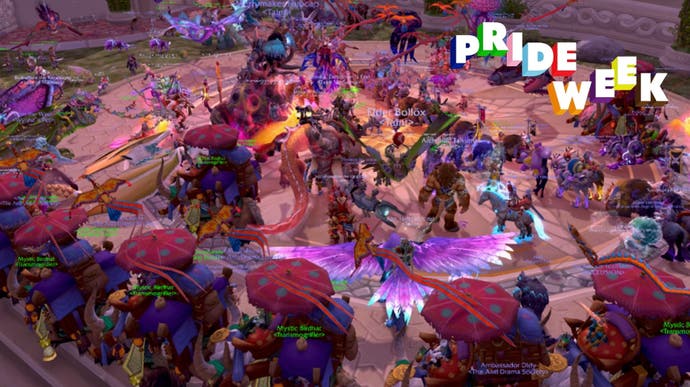Down and out in Orgrimmar and London
The continuing importance of LGBT+ spaces in gaming.
Hello! All this week we'll be celebrating Pride and the power of positive representations in games. Every day we'll be bringing you stories and insights from different parts of the LGBT+ community. You can also help support Pride with Eurogamer's newly redesigned t-shirt - all profits from which will be going to charity.
Spend any amount of time on any popular gaming message board when the issue of LGBT+ representation raises its head, and you can guarantee there'll be someone waiting in the wings to, at the very least, remind LGBT+ players that it's 2020 and 'nobody cares they're gay anymore' - oh, and 'would you mind keeping your sexuality out of my video games?'. It's not exactly surprising then that countless LGBT+ gamers around the world are still seeking the comfort of like-minded individuals and social spaces, both in-game and in real-life, where they're free to be themselves without abuse, judgement, or fear of repercussions - and to simply enjoy the games they want to play.
"I think in mainstream culture there is this wishful idea that because we've had too many seasons of Will & Grace...things are just fine and dandy for the queers in our society," Benjamin Bon Temps, founder of the long-running Rough Trade Gaming Community tells me, "Sadly, nothing could be further from the truth. While things are better, and the average Bubba Beercan Gamer might be more open-minded and respectful, there is still the same slew of tired asshats firing off verbal fag bombs and 'this stupid dungeon is gay' type bullshit."
It's a sentiment shared by Matthew Hardwick, co-founder of the on- and offline LGBT+ community London Gaymers; "Online spaces can be generally quite a negative experience for minorities as it is," he says, "but with insults like 'fag', 'queer', and 'gay' often thrown around in a derogatory manner, it can be particularly hard for LGBT people." By way of illustration, Hardwick relates one of his own experiences, when someone he'd played online with for over a year immediately bombarded him with abuse on finding out he was gay in party chat. "[He] said I should 'die of AIDS' and 'ass cancer' before threatening to come to my home to murder me."
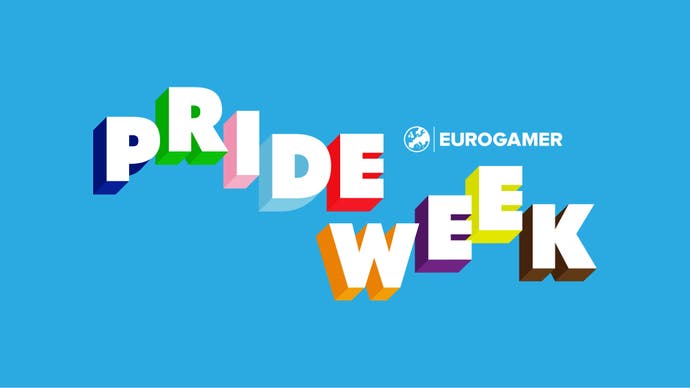
Although Hardwick admits this is one of the more extreme responses he's encountered, the constant minefield of anti-LGBT+ vitriol can be exhausting for players - and he points to an academic study by Jason Rockwood, backed up by London Gaymers' own research during MCM panels, which found 80% of people have heard anti-LGBT+ slurs online. When I ask Hardwick to describe these encounters in his own words, he simply responds, "Dehumanising".
It's for precisely these reasons that countless LGBT+ gaming communities have been established around the world in an effort to provide a safe, welcoming space for LGBT+ players and allies, and remain as popular as ever. The London Gaymers, for instance, started life as a Reddit community and Google group back in 2012, with the goal of providing a means for LGBT+ players to easily find others to enjoy video games with. "What online spaces existed already were toxic, and not very welcoming to any minority that was open about their identity," explains Hardwick.
And if proof were needed as to how much demand there still is for welcoming social spaces for LGBT+ players, the London Gaymers has, from its humble beginnings, now grown to over 3,750 people on its Facebook Group and over 1,800 regularly visit its Discord channel. Additionally, it has active guilds and clans hosting regular gaming nights for the likes of Minecraft, Final Fantasy 14, and Sea of Thieves; it has one of the largest LGBT+ WoW guilds in Europe; there's a dedicated space available for women, including non-LGBT+ players, looking for somewhere to play, and for other women gamers to talk to. And London Gaymers even has a pretty large Animal Crossing Turnip Exchange community too.
"Many LGBT people face an increased risk of Mental Health issues," explains Hardwick, "Isolation, anxiety, and depression are all issues many LGBT people face. Having a group that can knock down some of the barriers to battling those by providing a friendship group and space to express yourself is important".
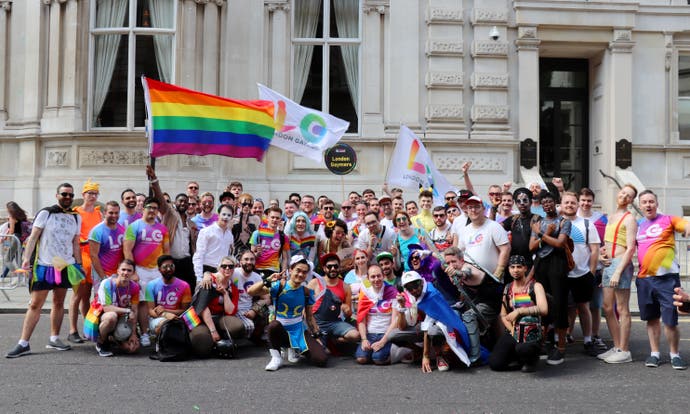
Inevitably too, these online communities have gradually spilled out into the real-world, and London Gaymers now hosts LGBT+ nights focussed on everything from board games and ping pong to bowling and laser tag. Crucially, these activities help provide real-world connections and spaces some may struggle to find ordinarily. "They may be feeling isolated or nervous, and not be willing to attend gay bars without people they know they can talk to about things they are interested in," says Hardwick, "or they may be nervous about their appearance or perception in a traditional gaming space. The group provides that intersection for LGBT people to be themselves in both their nerdy-ness and their queerness."
These days, thanks to London Gaymers' size and scope, the group is able to use its influence and community to assist other gaming and LGBT+ organisations. It's hosted panels on games industry representation at MCM, given talks to studios and government departments, and it regularly embarks on fundraising efforts with its members, for charities including the likes of SpecialEffect, the Terrance Higgins Trust, LGBT Hero/GMFA, and the Albert Kennedy Trust.
In real terms though, the London Gaymers reaches but a small fraction of LGBT+ players online and around the world, and thousands of other LGBT+ gaming communities continue to thrive, each catering to different audiences and niches. One of the oldest and most established of these is the MMO-focussed Rough Trade Gaming Community, described by its founder Benjamin Bon Temps as a "counterpoint to and escape from the general immature, homophobic bro culture that still permeates gaming spaces" and, more importantly, a "fun, safe, relaxing space where people can bring their authentic selves and play together" .
"Any queer can tell you that being seen and accepted feels awesome," he says, "and we do what we can to help make that happen for our members."
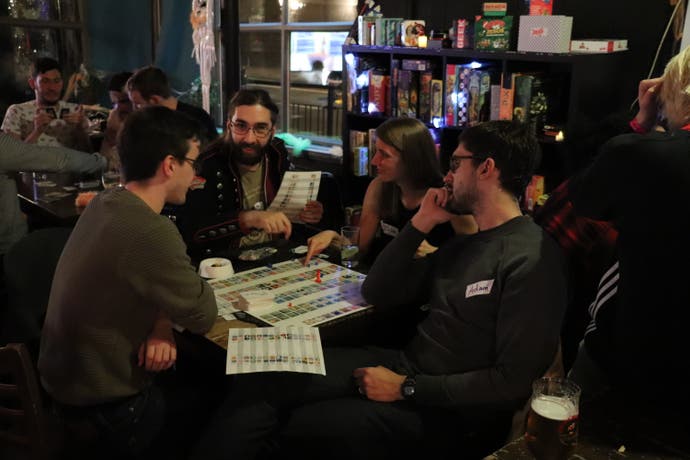
The RTGC had its unofficial beginnings over 17 years ago, when Benjamin joined a Dark Age of Camelot guild "comprised of mostly gay dudes and a few 'mo-friendly military guys". The group was eager to move over to superhero MMO City of Heroes but, says Benjamin, "I knew from somewhat bitter experience in DAoC that the gaming community at the time was absolutely rancid with frequent expressions of homophobic slang. Furthermore, there was, and still is, a 'don't tell, don't share' attitude from players claiming to be tolerant and accepting, yet [who] lose their collective minds if queer character options or a storyline is introduced in their favourite game, or if you reveal the gender of your partner in guild chat."
"Much of the social aspect in gaming happens during the downtime," he points out, "waiting on other players, recouping between battles, repairing armour etc., and that's when chatting about our lives happens. I've heard countless stories from other members of RTGC about how they'd have to lie about the gender of their partner and other details so as not to instigate the possibility of harsh comments from other intolerant players."
While some groups prefer to offer a somewhat sanitised space for their members, Benjamin notes the RTGC is relatively unique in that it has never shied from the subject of sex. "There always seems to be a secondary censoring of queer lives and stories by the mainstream," he explains, "something along the lines of 'Okay, you are gay and you can talk about it a little, but nothing about your sexual acts, preferences or fetishes please'...but I've always been at least mildly interested in what excites people, whether it be geekery or in the sack or sling."
And so, from that goal of building a community that didn't just enjoy games, but welcomed all kinds of sexual expression, the Rough Trade Gaming Community was created as an "unapologetically queer [place to] celebrate geekdom and fetish life." Benjamin admits the group "might not be everyone's cup of tea" thanks to its openness to fetish and kink, but says he believes it's a "good fit for the queer person who may feel too queer, too kinky, too hardcore in mainstream gay social spaces." What's more, it also happily welcomes "heterosexual-identified players who, because of their own kink, political views, spiritual practices, or whatever else, don't feel comfortable in standard gaming social spaces".
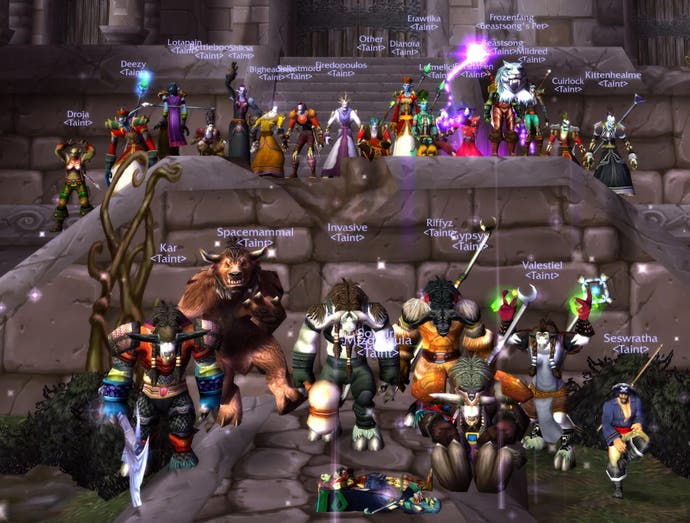
"We're also a great testing ground for those of us emerging, or considering emerging, from the closet," says Benjamin, "We are a very welcoming bunch for the most part and online experimentation in a gaming environment can be a fun and safe way to experiment with self-expression."
It's a social mix that's clearly working; the group now organises real-life meets around the likes of San Francisco and New Orleans, and Benjamin is proud to have helped build a community that can cater to both younger gamers and "an older and more mature player".
These days the RTGC has over 9,000 active users online, split across six officially supported games (World of Warcraft, World of Warcraft Classic, Final Fantasy 14, Guild Wars 2, Elder Scrolls Online, and Phantasy Star Online 2), alongside a variety of forums and social media sites including Facebook. "Our Xtube channel has close to 2 million views," notes Benjamin, "but honestly most of those are probably from me."
One of the RTGC's most high-profile activities comes in the form of Pixel Pride, an annual virtual Pride event that started out back in the group's City of Heroes days and is now celebrating its 16th year. "We wanted to show how many players in the game were queer," says Benjamin of that initial event, "so every queer superhero in the game wore the colour red and we flew, leapt, and teleported to a central meeting place, and had a great time."
These days Pixel Pride takes place every July on World of Warcraft's Proudmoore server that many of the group's guilds calls home, and this year's pride celebrations - which occurred last weekend - passed in a flurry of 'donations, support, dancing, laughing, flirting, and duelling in their skivvies'.
"Pixel Pride," explains Benjamin, "is important because of the ease of accessibility for folks who can't and don't want to find parking at real world Prides, for folks who for whatever reasons can't be fully out in the real world, and to also remind the non-queers on our servers that we are here, and we are legion, and that the toon tanking in your party, or healing your ass in a dungeon, or peeling aggro off you in PvP might be one of us, so watch your fucking language."
Benjamin believes Pixel Pride is valuable for those group members in rural areas too. "We know that queers can tend to flock to big cities to find their tribe, but we also have tons of players who live in remote areas as well", he says. "I've heard from folks like that who are grateful for our Pixel Pride celebrations because, due to distance, or being in the closet, or mobility challenges, that is the only Pride they can safely or reasonably attend. This has, of course, become even more important during the current pandemic."
Yet despite the obvious demand for the kind of LGBT+ communities and spaces fostered by the likes of London Gaymers and the RTGC, resistance still remains in the wider gaming community to the idea that visibility for LGBT+ players is even necessary, usually, and tellingly, alongside the declaration that 'politics doesn't belong in video games'.
"In much the same way a fish can't really tell you what 'wet' feels like, because it is all they've ever known, straight folk can be blind, and sometimes stubbornly and wilfully so, to how inextricably enmeshed expressions of affection, sexuality, longing, romance etc. are in our everyday lives," says Benjamin. "It permeates everything we experience, games included. Every game I've played has some element of a love interest storyline, an unrequited romance, etc. It is just fair play that some of those reflect our lives as well."
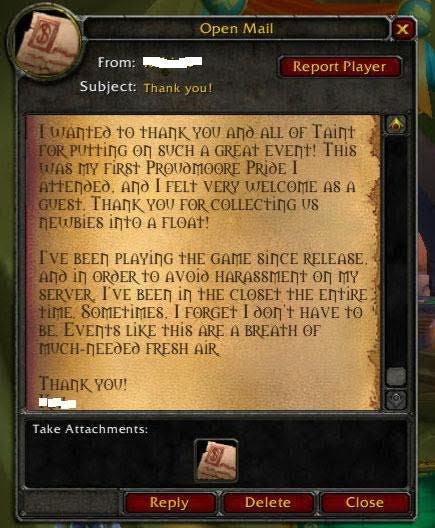
The good news, though, according to London Gaymers' Matt Hardwick, is that attitudes do slowly seem to be shifting. "Anecdotally, I would say things have improved over the years, certainly within some areas of online gaming," he tells me, "[but] there is still a long way to go."
"I think that developers play a big part in this. Weeding out toxic behaviour is something that a few studios say they are dedicated to but is seldom reflected in their feedback loops or reporting processes," Hardwick continues. "Gamers at large can help by calling out the behaviour when they see or hear it. Remind [those responsible] that whilst they may think it's trash talk they have no idea how their words affect those around them. I do however appreciate this is often easier said than done and that's why spaces like London Gaymers exists - nobody wants to paint a target on their back - but using reporting processes is always one small step that doesn't require you to interact with trolls."
Yet while a harmonious gaming future will ultimately benefit everyone, and is a goal worth aiming for, Benjamin doesn't think it will spell an end to LGBT+ gaming spaces.
"It can obviously be challenging to be your true queer self, in the 'real' world and in-game, and a lot of old, tired attitudes and beliefs can get in the way and make that difficult to attain," he says. "Once we have though, one of the great blessings about being queer, for me anyway, is the ability to be a little left of centre, to be slightly outside what is considered 'normal' or 'average'. I think that is intensely valuable, both for queers and for the heteronormative, relative 'centre', to have that perspective and space for folks who don't feel they fit in with whatever the fuck 'normal' is.
"For that reason, I think and hope we'll always occupy that space, to question and challenge expected norms, 'common wisdom' and convention. To not have that, to have everything and everyone in one homogeneous space, would dilute the colourful and diverse part of the human experience and that would just be boring as fuck...Things could be, and certainly might be, better than they are today, but whether that happens or not, the Rough Trade Gaming Community will be here as a space for anyone fun, friendly, and ready to play."
